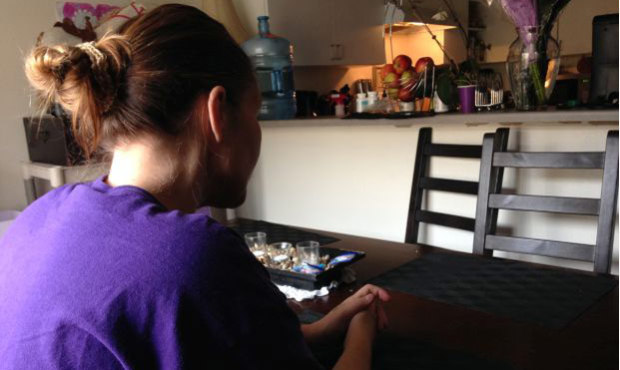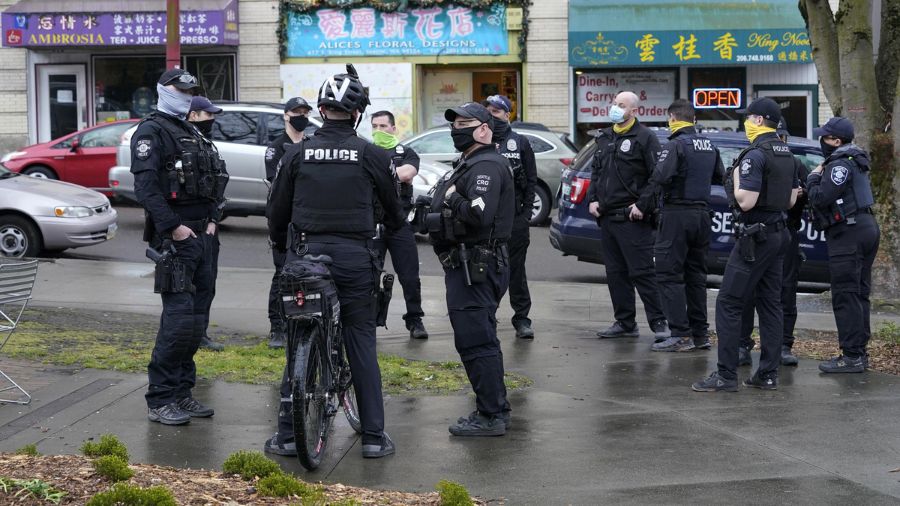Former prostitute says ‘nothing worse’ than Snohomish County
Sep 23, 2015, 12:17 AM | Updated: 10:59 am

"Charlotte," a former prostitute, says sex trafficking in Snohomish County is some of the worst she's seen. (KIRO Radio/Colleen O'Brien)
(KIRO Radio/Colleen O'Brien)
Sexual slavery might be considered a big city problem, but that’s not the entire reality today. In fact, Snohomish County and its suburban cities keep busy with dozens of sex trafficking cases.
A recent Everett Herald story caught my attention. A husband and wife were arrested for allegedly selling three girls, ages 15, 16 and 17, for sex at an Everett motel.
Detectives swooped in and saved the girls, and the husband and wife are facing long prison sentences. In the same story, the Herald reported that the county is currently investigating 45 sex trafficking cases.
It sounds like a lot for the county in which I grew up. What did I miss? I got answers from a woman I’ll call Charlotte, a former prostitute in Snohomish County.
“I have never seen nothing worse that I have in Snohomish County,” Charlotte told me. “Broadway … any street. It’s all over. It’s crazy the more I get down the line [of recovery] I don’t see it as much but when I was down there in the dark … it’s constant.”
Charlotte spent years fighting for her life in the streets of California as a sex slave, but calls Snohomish County the worst.
She says she was locked in a cab in Everett once and propositioned by the driver. Even today, as she works on her recovery, she’ll be standing at a bus stop and a driver will go by looking for action. Charlotte wonders, “Is it written on my forehead?”
Sometimes she’ll see a young group of girls walking down the street and shakes her head because, she thinks, they have no idea about the threat of entrapment — the pimp ready to pounce.
“They don’t see it, they don’t look, they’re not down here at the bottom on the brink of where all that … they go on with their busy lives and they don’t see,” Charlotte said. “They’re not looking; they’re not aware of it.”
Charlotte is tired of seeing girls get sucked in to the life she lived for more than a decade. She wants to help and for you to be aware because pimps work quickly.
Once she escaped her home life — one of sexual abuse and alcoholism — Charlotte turned sex into a survival mechanism. She converted her California house into a sort of brothel.
It was as simple as needing to make rent, she says, which was a problematic method that took a drastic turn for the worse when she met a pimp who wanted her as his product.
“I was talking to a girl and I didn’t know I was pulling her away from her pimp,” Charlotte said. “And her pimp was watching me and I was running my mouth, talking about what we were doing at the house and I didn’t know what he was about. He seemed like a really nice guy, brought groceries in, said I didn’t have to do other things. A week later, he smashed my head into a wall and told me I was his.”
Charlotte says she might have been susceptible because of her painful childhood, but she points out that not all girls have to be “damaged” to be trapped. She says pimps also recognize when a girl won’t respond to male attention so they try a different angle: The Mother Figure.
“That’s what my job was supposed to be because I’m very … my loving nature,” Charlotte said. “I’m calming, I can make them feel welcomed and trust. There was a 16-year-old, maybe 15 to 16-year-old, who ran away … vulnerable ones, ones that are hurting, not getting along at home, that’s what you spot. You look for the ones who are really hurting or needing something.”
That gave me chills. Predators top any parent’s list of fears, but they may not look like who we imagine.
Charlotte says even if a girl does escape, like she finally did, pimps are almost assured the girls will come back because there’s virtually nowhere to go.
“They put me in a [domestic violence] home, but they didn’t want me there because of the severity of the case,” she said. “First of all, [my pimp] was a gang leader. He found me walking down the street and came up right behind me and scared me. I let them know that he had found me and they made me leave. I was right back out there again.”
The cycle of coming and going didn’t stop for Charlotte until a friend brought her up to Snohomish County from California. It proved difficult to recover, but ultimately, she persevered and just recently graduated from drug court. She’s now working on advocacy training.
Charlotte’s goal: open the shelter that she needed so badly all those years ago.
“If you can just help the ones that are out there crying out, God help me, what are we going to do to make a change in this world?” she asked. “What are we going to do? Even if it’s one person at a time; that girl. Knowing if I can do it, they can do it. But I pray and I continue to do [interviews] so that I can find a way when they’re ready.”
The discovery that there are no shelters specific to victims of sexual slavery may come as surprising. By some estimates, there are about 200 beds in the nation specifically available to women who escape sexual slavery.
This is a journey of discovery and I’m hoping that if you live in Snohomish County, or any surrounding suburb, you’ll find it worthy to discover along with me.
Next week, KIRO Radio’s Colleen O’Brien will talk with Paula, a forensic nurse who is working with Charlotte to build a recovery center. Paula has a very personal reason to fight sex crimes in Snohomish County: her daughter.













